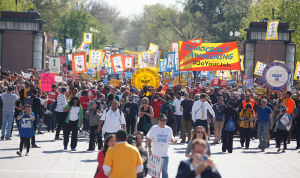
Eleven Georgetown students participated in week-long Democracy Spring protests at Capitol Hill against government corruption and voting discrimination.
At least two Georgetown University students were arrested Monday during this week’s Democracy Spring protests, which began April 12. The protests were focused on ending voting discrimination and U.S. government corruption including special interest contributions in politics, and these arrests added to the nearly 1,300 others apprehended.
The weeklong protests, along with a 10-day march from Philadelphia to the U.S. Capitol, represented part of a larger progressive movement organized by Democracy Awakening, a coalition of over 200 organizations ranging from immigration policy to climate change advocacy groups. Eleven of the 3,500 people who participated in the protests were Georgetown students.
Democracy Initiative, a progressive national coalition supporting campaign finance reform and voters’ rights, attended the protests and hosted several events prior to the rallies, including a letter-writing campaign to members of Congress in opposition and support of various pieces of legislation. The initiative is headed by the National Education Association, the Sierra Club, Greenpeace, the Communications Workers of America and the National Association for the Advancement of Colored People.
The initiative also organized a panel on campus co-hosted by the Georgetown NAACP, the Georgetown program on justice and peace and the Georgetown University Lecture Fund featuring NAACP President and CEO Cornell Brooks titled “Democracy Awakening: Panel and Discussion” in Reiss on March 31.
The Georgetown students, who attended the rally along with peers from Howard University, American University and the University of Maryland, were arrested while protesting in front of the Capitol, according to Democracy Initiative Communications and Organizing intern Katharine Viles (SFS ’16).
Viles, who was not arrested, said the purpose of the protests was to garner attention and visibility for the cause rather than initiate plans for any federal policy changes.
“I think there was an understanding in the progressive community that we are not going to be able to pass anything at the national level,” Viles said. “This is really the only way that we would be able to get the ball rolling, and this was not so much about actually passing anything. This was about momentum and this was about raising the visibility of a movement.”
According to the Democracy Spring website, the movement aims to tackle citizen frustrations with the role of large corporations in politics.
“American elections are dominated by billionaires and big money interests who can spend unlimited sums of money on political campaigns to protect their special interests at the general expense,” the website reads. “Meanwhile, as the super-rich dominate the ‘money primary’ that decides who can run for office, almost half of the states in the union have passed new laws that disenfranchise everyday voters, especially people of color and the poor.”
According to Democracy Awakening’s website, the group’s demands include fair consideration of chief judge of the United States Court of Appeals Merrick Garland’s nomination to the Supreme Court, the approval of acts to increase voting rights and combat voting discrimination as well as amendments to overturn the Citizens United v. Federal Election Commission decision, which allows unlimited independent political spending by individuals and corporations.
Participants of the movement expressed willingness to be arrested on the official misdemeanor charge of “crowding, obstructing, or incommoding,” after which they had the option of paying a $50 charge rather than appear in court.
The U.S. Capitol Police acting Communications Director Eva Malecki confirmed that the federal enforcement agency, which protects Congressional facilities, made 1,240 arrests since April 11 in association with the ongoing Democracy Springs demonstrations.
“When demonstrations occur in the restricted areas, individuals are given warnings to leave that area,” Malecki wrote in an email to The Hoya. “If they do not leave voluntarily, they will be arrested.”
Viles said that although the risk of arrest was high, protestors could easily post bail and forfeit the charge after they were taken into custody. Viles highlighted the sense of urgency spurred by an atmosphere created by arrests occurring in the hundreds.
“It was a low-risk situation overall, but there is something about being in a situation with any risk at all that makes people feel it in a much more real way that these issues are important and this is something that is urgent for all of us,” Viles said.
In addition to student arrests, actress Rosario Dawson and Ben & Jerry’s Ice Cream founders Ben Cohen and Jerry Greenfield were also apprehended at the demonstration.
According to a press release on the Ben & Jerry’s blog, prior to being taken into custody, Cohen said he was willing to face arrest to see governmental change.
“The history of our country is that nothing happens until people start putting their bodies on the line and risk getting arrested,” Cohen said.
Viles said that despite the high number of arrests, the atmosphere was lighthearted.
“I think it was a very powerful event,” Viles said. “A lot of people think of risking arrest as this serious thing but the founders of Ben & Jerry’s were dancing when they got arrested, so it was actually a fun event, which is something that not a lot of people get.”
Tanner Hinkel (SFS ’18), who also attended the march Sunday but was not arrested, said he was optimistic about the civic engagement exemplified in the protests.
“It was really good to see a bunch of people who were engaged and felt very passionate about voting rights and campaign finance reform and believed that it had a larger and greater impact than just within those communities,” Hinkel said. “It was really good to see a lot of people from various places coming together and getting involved and uniting over these issues.”




















